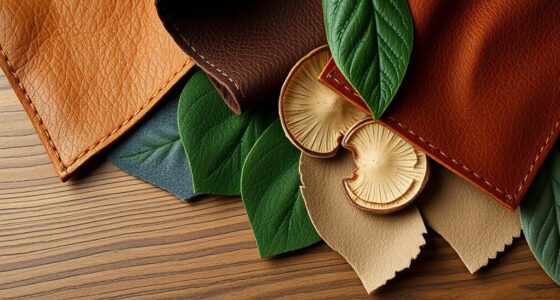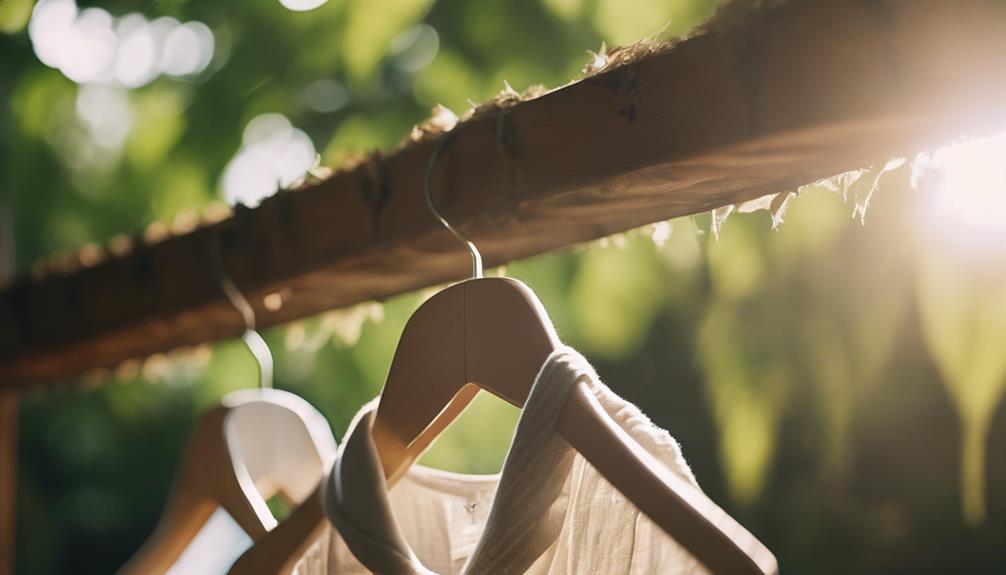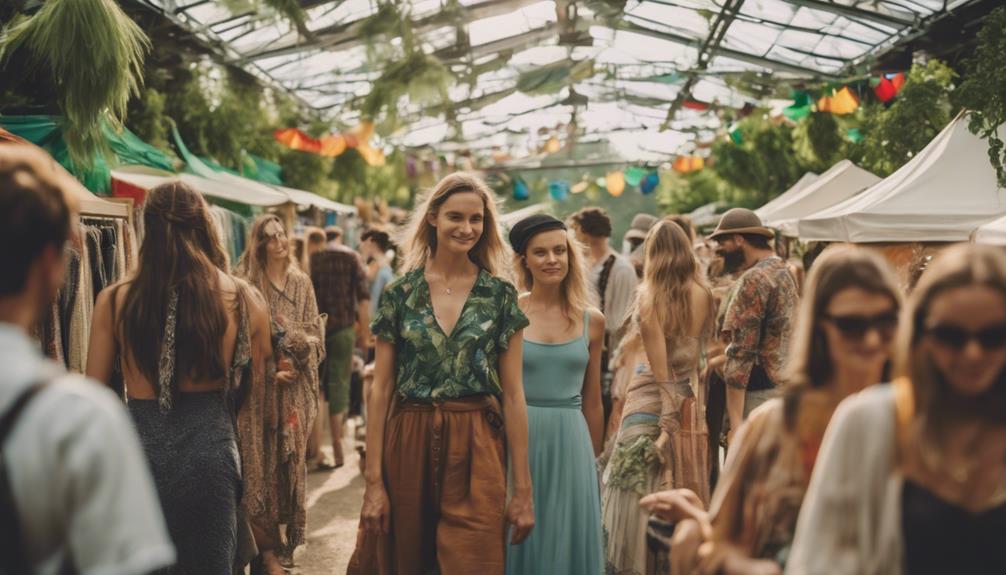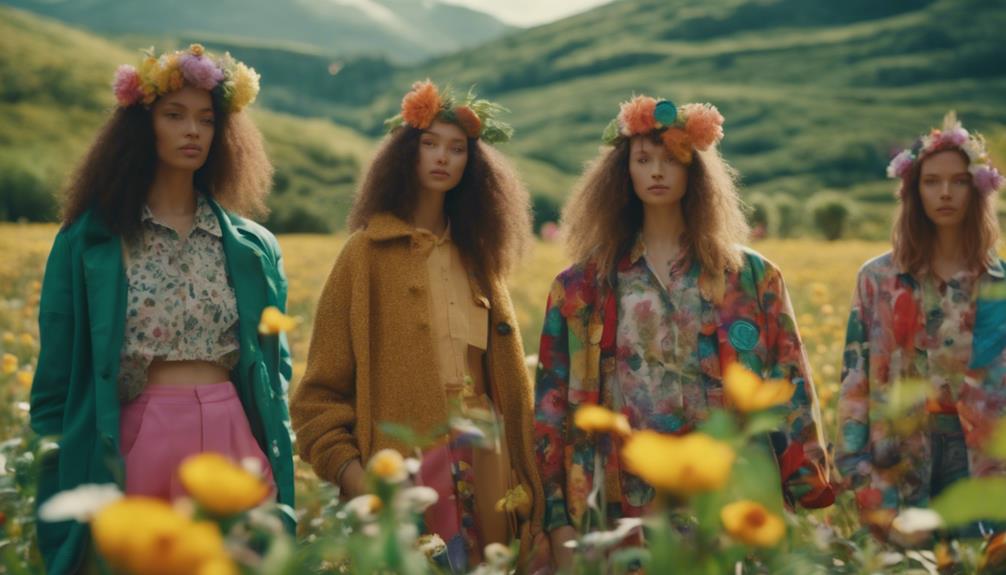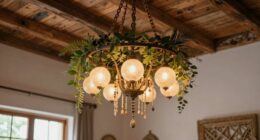If you’re interested in sustainable fashion, you’ll be impressed by the variety of brands available! PACT offers affordable organic cotton clothing, while Everlane is dedicated to transparency in production. On the eco-friendly front, brands like Amour Vert plant a tree for every t-shirt sold. For unique pieces, explore vintage-inspired options from Christy Dawn. Looking for size inclusivity? Reformation and Boody offer a range of sizes and sustainable materials. With so many choices, it’s simple to make a positive impact through your clothing choices. Stay tuned to discover even more brands that prioritize sustainability!
Key Takeaways
- PACT: Offers GOTS certified organic cotton clothing under $100, promoting eco-friendly packaging and biodegradable materials for a sustainable wardrobe.
- tentree: Plants ten trees for every purchase, using biodegradable materials and focusing on a circular economy in fashion.
- Reformation: Uses sustainable fabrics and aims for climate-positive status by 2025, providing transparency about its environmental impact.
- People Tree: Fair Trade certified, focusing on artisan craftsmanship and fair wages, ensuring ethical labor practices in its production process.
Budget-Friendly Sustainable Brands
When you're on a budget but still want to make sustainable choices, several brands offer stylish, eco-friendly options without breaking the bank.
For instance, PACT provides budget-friendly clothing made from organic cotton, with most items priced under $100 and a size range from XS to 3XL. If you're looking for biodegradable basics, Fair Indigo offers GOTS certified organic cotton apparel at affordable prices, contributing to the Fair Indigo Foundation for social impact.
Everlane stands out with its commitment to ethical production and transparent pricing, ensuring you can find quality apparel made from sustainable materials in sizes ranging from XS to XXL.
Another great option is Yes Friends, which specializes in affordable Fair Trade clothing produced in solar-powered factories and utilizes organic and recycled fabrics, available in sizes XXS to XXL.
Lastly, Boody features bamboo fabric clothing for men, women, and babies, with prices ranging from $14 to $100, promoting sustainable practices through closed-loop production.
With these sustainable brands, you don't have to compromise on style or ethics, even on a budget.
Organic and Eco-Friendly Labels
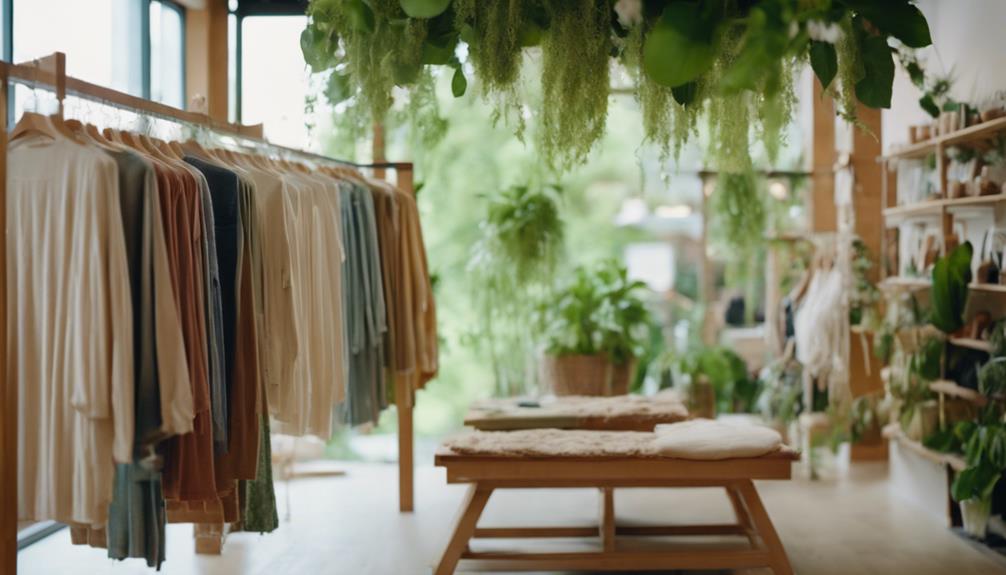
Exploring organic and eco-friendly labels reveals a range of brands committed to sustainable practices while offering stylish, high-quality options for conscious consumers.
Brands like Pact stand out for their GOTS certified organic cotton garments, featuring eco-friendly packaging and biodegradable materials. If you're looking for something unique, Amour Vert plants a tree for every t-shirt sold and uses non-toxic dyes, all while partnering with local artisans for ethical manufacturing.
Thought Clothing specializes in timeless styles made from natural materials like bamboo and hemp, ensuring fair trade production methods. For size-inclusive options, check out Boody, known for its vegan-friendly clothing crafted from OEKO-TEX® and ECOCERT certified bamboo. They also contribute to environmental initiatives, committing 1% to the Planet.
Kotn, a certified B Corp brand, combines affordability with sustainability, offering biodegradable materials while giving back to Egyptian communities.
These sustainable fashion brands embody the essence of slow fashion, promoting ethical practices and high-quality craftsmanship. By choosing these labels, you contribute to a more sustainable future, making fashion a force for good.
Circular Fashion Innovators
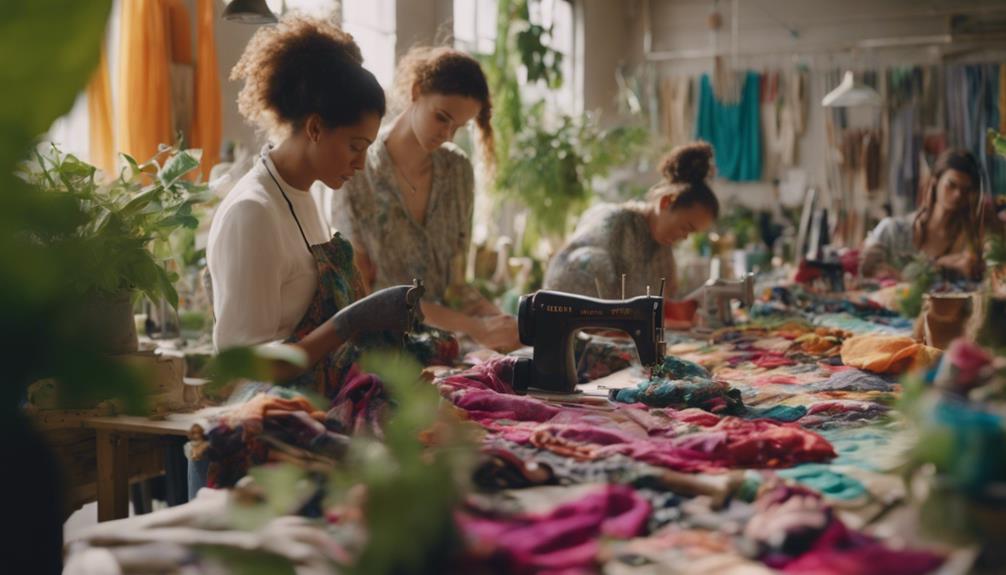
When you think about circular fashion innovators, consider how they challenge traditional practices with innovative solutions.
These brands use sustainable materials and implement practices that extend the lifecycle of products, all while making a positive impact on their communities.
Innovative Circular Practices
Innovative circular practices are reshaping the fashion industry, with brands like tentree and MUD Jeans leading the charge toward sustainability.
Tentree, a certified B Corp, emphasizes the circular model by planting ten trees for every purchase, making a positive environmental impact while using biodegradable materials.
MUD Jeans takes a unique approach by offering a leasing model, allowing you to return worn jeans for recycling, which promotes sustainable consumption habits.
Brands like Reformation and Eileen Fisher also embody these circular practices.
Reformation uses sustainable materials and aims for climate-positive status by 2025, providing transparency about the environmental impact of each product.
Eileen Fisher focuses on organic and recycled materials, implementing a take-back program for worn garments to reduce waste and encourage longevity in fashion.
Pangaia stands out by integrating innovative sustainable textiles, incorporating bio-based and recycled materials into their products while engaging in environmental conservation initiatives.
These brands not only prioritize ethical practices but also educate you on making sustainable choices, ensuring your fashion decisions contribute positively to the planet.
Embracing these circular practices helps redefine your understanding of sustainable fashion.
Sustainable Materials Usage
Sustainable materials play a key role in the circular fashion movement, with brands like tentree and MUD Jeans leading by example through their commitment to eco-friendly practices. These sustainable fashion brands utilize innovative materials and focus on ethical production to greatly reduce their environmental impact.
Here's a look at how these brands contribute to sustainable materials usage:
| Brand | Sustainable Practices |
|---|---|
| tentree | Plants ten trees for every purchase; focuses on biodegradable products |
| MUD Jeans | Offers a leasing model, encouraging recycling to reduce textile waste |
| Reformation | Uses regenerative fabrics; aims for climate-positive status by 2025 |
| Eileen Fisher | Collects and resells gently worn garments through the Renew program |
| Pangaia | Utilizes bio-based and recycled materials to support a circular economy |
Impactful Community Contributions
Circular fashion innovators like tentree, Eileen Fisher, and MUD Jeans are transforming communities by actively engaging in practices that promote environmental stewardship and social responsibility. These brands not only focus on sustainable fashion but also make significant community contributions that positively impact the environment.
Here's how they do it:
- Tentree: For every purchase, they plant ten trees, directly supporting reforestation efforts and fostering a circular economy.
- Eileen Fisher: Their Renew program allows you to return used garments, ensuring they're either resold or recycled, which emphasizes ethical manufacturing and recycled materials.
- MUD Jeans: They offer a denim leasing model, encouraging you to return jeans for recycling, minimizing textile waste and promoting environmentally conscious production methods.
Ethical Labor Practices
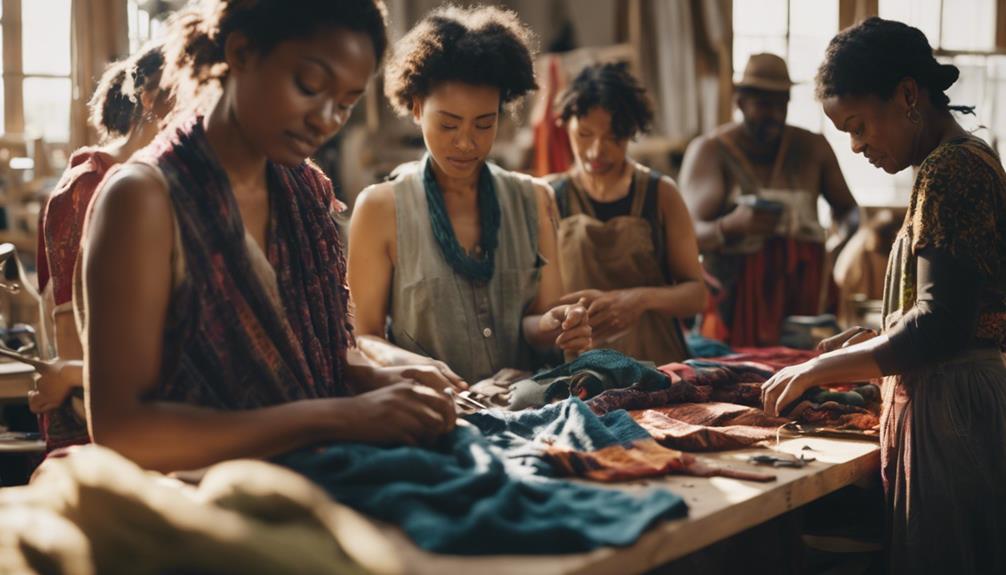
Ethical labor practices are essential in the fashion industry, ensuring that workers are treated fairly and compensated justly throughout the supply chain. Brands committed to sustainable fashion prioritize these practices, focusing on fair wages and transparency. By supporting artisans and employing ethical manufacturing methods, they foster eco-friendly environments and promote artisan craftsmanship.
Here's a comparison of some leading brands dedicated to ethical labor practices:
| Brand | Key Practices | Commitment to Sustainability |
|---|---|---|
| People Tree | Fair Trade certified, artisan craftsmanship | Strong focus on fair wages |
| Nisolo | Transparency in supply chain | Fair wages for artisans |
| Toms | One-for-one giving model | Ethical manufacturing practices |
| Everlane | Radical transparency | Ethical factories worldwide |
| Eileen Fisher | Circular fashion, fair wages | Strong commitment to sustainability |
Size Inclusive Options
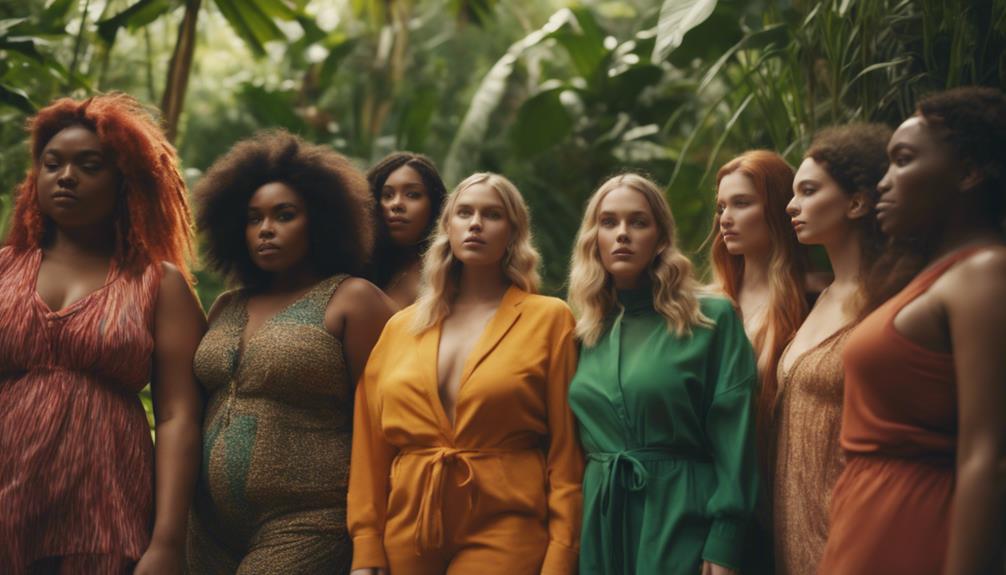
Many fashion brands now offer size-inclusive options, ensuring everyone can find stylish and comfortable clothing that fits their body type. This commitment to inclusivity goes hand in hand with sustainable practices, allowing consumers to make ethical choices without sacrificing style.
Here are three standout brands that prioritize size inclusivity:
- Warp + Weft: With an impressive 75 sizes available, from XS to 3XL (up to US 24), they focus on water conservation by recycling 98% of the water used in production, making their jeans both stylish and eco-friendly.
- Reformation: Offering sizes from XXS to 3X, Reformation uses sustainable fabrics and provides transparency in their environmental impact, ensuring your choices are informed and ethical.
- Boody: Featuring a size range from XS to 4XL, Boody's clothing is made from OEKO-TEX® and ECOCERT certified bamboo, promoting a minimal impact on the planet while being Fair Trade Certified.
These brands demonstrate how size-inclusive fashion can align with ethical production, organic fabrics, and recycled materials, allowing you to feel good about what you wear.
Vintage and Pre-Loved Finds
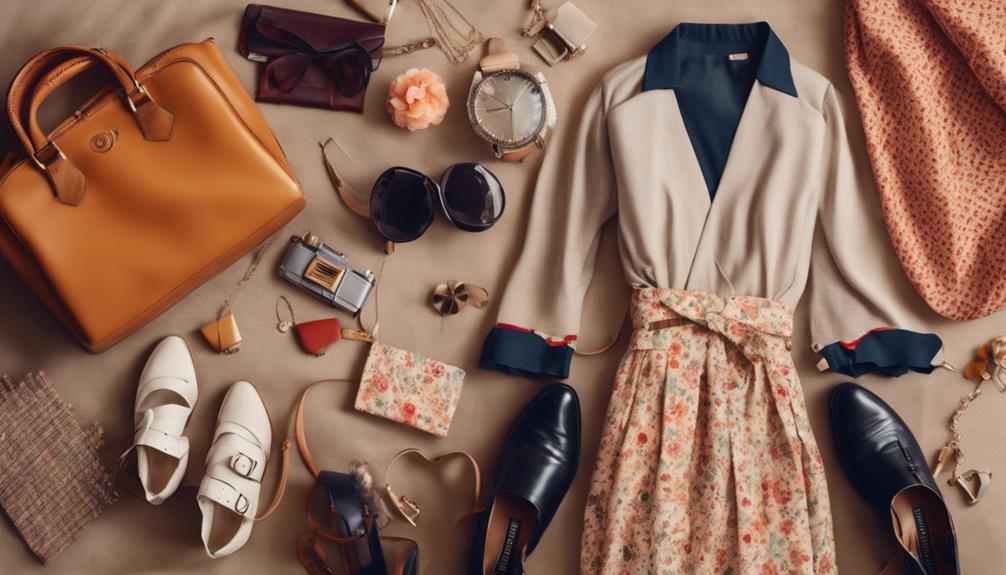
When you choose vintage and pre-loved clothing, you're not just making a stylish statement; you're also helping reduce textile waste.
Brands like Christy Dawn and Toad & Co showcase how sustainable fashion can be both unique and eco-friendly.
Plus, shopping platforms like thredUP make it easier than ever to find one-of-a-kind pieces that add character to your wardrobe.
Benefits of Vintage Clothing
Embracing vintage clothing not only reduces textile waste but also allows you to discover unique, high-quality pieces that tell a story. By choosing vintage and pre-loved items, you support a more sustainable fashion industry and contribute to a circular economy.
Here are three key benefits of opting for vintage clothing:
- Quality and Craftsmanship: Vintage pieces often showcase high-quality craftsmanship and unique designs that stand out from mass-produced fashion. You'll find garments that not only look great but also last longer.
- Sustainable Choices: Purchasing secondhand clothing helps reduce textile waste and minimizes the need for new production. This choice conserves resources and promotes sustainable practices in the fashion world.
- Supporting Local Economies: When you shop vintage, you often support small businesses and local economies. Many vintage shops and thrift stores are independently owned, contributing to the growth of your community.
Popular Pre-Loved Brands
Exploring popular pre-loved brands reveals a treasure trove of sustainable fashion options that not only reduce waste but also offer unique styles. For those looking to make more ethical and eco-friendly fashion choices, sustainable fashion brands are definitely worth considering. These brands place a strong emphasis on using environmentally friendly materials and ethical production practices, making them a great choice for conscious consumers. By opting for these pre-loved sustainable fashion brands, individuals can not only look great but also feel good knowing they are supporting more responsible and sustainable fashion options.
For instance, Etsy is a fantastic marketplace for vintage and handmade apparel, directly supporting small businesses while promoting eco-friendly practices. If you're looking for gently used women's and kids' clothing, thredUP specializes in a vast selection of secondhand items that help reduce textile waste and encourage sustainable fashion practices.
Haverdash takes a unique approach with its clothing rental subscription service, allowing you to enjoy various styles while minimizing your environmental impact through pre-loved clothing. Additionally, Toad & Co embraces a circular fashion model by offering vintage and pre-loved options, all packaged in eco-friendly materials.
Lastly, Christy Dawn's vintage-inspired clothing made from deadstock fabrics guarantees that timeless fashion is celebrated while contributing to waste reduction in the industry.
Frequently Asked Questions
Who Is the Most Sustainable Fashion Brand?
Determining the most sustainable fashion brand depends on your values. You might prioritize transparency, materials, or ethical practices. Brands like Patagonia and Eileen Fisher lead in different areas, so it's all about what matters most to you.
Which Luxury Brands Are Not Sustainable?
Many luxury brands aren't sustainable due to high carbon footprints, resource-intensive production, and lack of transparency. Brands like Gucci, Louis Vuitton, and Chanel often face criticism for their environmental impact and traditional material use.
Is H&M Not Sustainable?
You might think H&M's sustainability efforts are impressive, but they're not truly sustainable. Their high production volumes and reliance on resource-intensive materials undermine genuine environmental progress, making their claims seem more like marketing than real change.
Is Zara a Sustainable Brand?
Zara's sustainability efforts, like using 100% sustainable fabrics by 2025, sound promising. However, their fast fashion model promotes frequent purchases, contradicting true sustainability. You should weigh these factors when considering Zara as a sustainable brand.
Conclusion
When you choose sustainable fashion, it's like planting a seed in a garden of change.
Just as a single seed can grow into a flourishing tree, every eco-friendly purchase you make contributes to a healthier planet.
By supporting budget-friendly brands, embracing circular fashion, and opting for vintage finds, you're not just updating your wardrobe; you're nurturing a movement.
So, let's wear our values and cultivate a future where style and sustainability bloom together!


